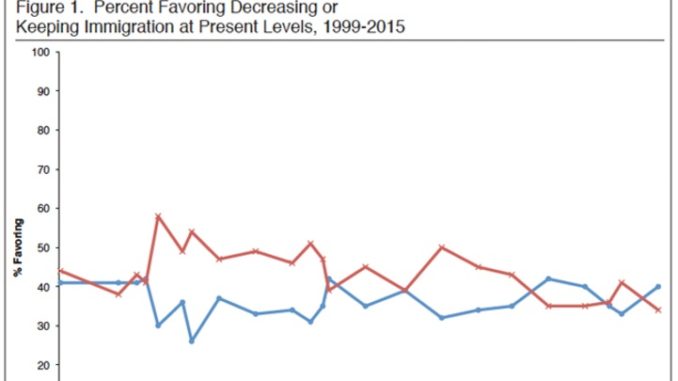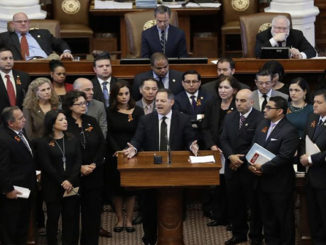
by Alex Nowrasteh
James G. Gimpel’s new report for the Center for Immigration Studies (CIS) has a good summary of voter opinion on immigration and how the issue influenced the rise of Donald Trump. Undoubtedly, that issue key to his success in the GOP primary, although it’s unclear why equally nativist but more polite candidates like Mike Huckabee, Rick Santorum, and Scott Walker failed to gain traction.
My only problem with this report is its selective display of Gallup’s immigration polling data. The CIS starts reporting the results in 1999 and omits whether Americans support more immigration (Figure 1). By starting the data in 1999, the report is able to argue that opposition to legal immigration and those supporting the same number of immigrants have been roughly constant since 1999.
Figure 1
CIS Graph
Source: Immigration Opinion and the Rise of Donald Trump.
If the CIS report had included the “Increased” immigration option in the poll and the years going back to 1965, you would have seen this (Figure 2). I highlighted the years 1993 and 2015 to show how far public opinion has shifted toward the pro-immigration side over the last 22 years.
Figure 2
Gallup Opinion on Immigration

Source: Gallup.
A mere six percent of the public supported increased immigration in 1993, but that increased to 25 percent in 2015 – a more than four-fold jump. Those satisfied with present immigration levels increased by 13 percentage points. Those who supported less immigration, CIS’ stated policy goal, decreased from 65 percent of the U.S. population to 34 percent. Since nativism’s high-water mark in 1993, a greater percentage of Americans support the same level of immigration and more legal immigration than ever before. The last time the less immigration position was this unpopular, Congress passed the Immigration Act of 1965 – that’s a good omen.
Gallup’s findings are not an aberration. Other polls conducted by the General Social Survey, the American National Election Survey, and New York Times-CBS all find similar results. Trump has done well with the segment of the population that wants to shrink immigration, but that segment has imploded over the last 22 years. Americans are not anti-immigration and those who do hold such beliefs are shrinking as a percentage of the population.
Alex Nowrasteh is the immigration policy analyst at the Cato Institute’s Center for Global Liberty and Prosperity.




